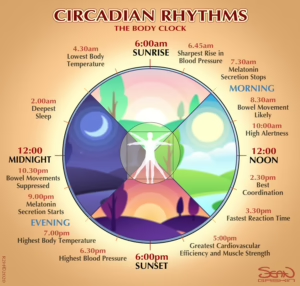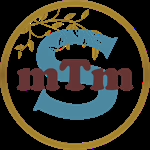Circadian Rhythm-Based Sports Massage: Timed Therapy for Maximum Effectiveness
 The traditional approach to sports massage has entered a new dimension with advances in chronobiology and circadian rhythm research. The internal biological clock not only regulates the sleep-wake cycle but fundamentally influences muscle regeneration, inflammatory processes, and performance optimization. Recent research indicates that the timing of massage therapy may be critically important for athlete recovery and performance maximization.
The traditional approach to sports massage has entered a new dimension with advances in chronobiology and circadian rhythm research. The internal biological clock not only regulates the sleep-wake cycle but fundamentally influences muscle regeneration, inflammatory processes, and performance optimization. Recent research indicates that the timing of massage therapy may be critically important for athlete recovery and performance maximization.
The 2017 Nobel Prize in Physiology or Medicine was awarded to Jeffrey C. Hall, Michael Rosbash, and Michael W. Young for discovering molecular circadian mechanisms, establishing the scientific foundation for chronotherapy. For athletes, this is particularly significant as their bodies are constantly subjected to varying loads, and optimizing recovery is key to their competitiveness.
Internal Biological Clock Effects on Muscle Regeneration
Recent Northwestern Medicine research demonstrates that circadian rhythms fundamentally influence the speed and effectiveness of muscle regeneration. Professor Clara Peek’s studies revealed that muscle injuries occurring during waking hours heal faster than damage that occurs during sleep periods. This is underpinned by circadian regulation of muscle stem cells, which modulates inflammatory responses in a time-dependent manner.
At the muscle tissue level, circadian genes regulate protein synthesis, mitochondrial function, and oxidative stress management. Clock Controlled Genes (CCGs) represent approximately 17% of rhythmically expressed genes in skeletal muscle, most of which peak during the mid-dark phase of the active period.
Cytosolic NAD+ (nicotinamide adenine dinucleotide) regeneration plays a key role in this process. The circadian clock in muscle stem cells activates time-dependent inflammatory gene expression after injury, particularly genes related to neutrophil activity and chemotaxis. This mechanism ensures optimal communication between immune cells and muscle stem cells depending on the time of day.
Optimal Massage Timing Protocols
Optimal timing of sports massage is a complex issue that considers circadian peak performance timing, biological rhythms of muscle regeneration, and individual chronotype. Research shows that most sports performance components vary sinusoidally throughout the day, peaking in late afternoon hours, close to the daily body temperature maximum.
Pre-event massage timing
Pre-competition massage should be applied 15-45 minutes before the event. Techniques should be light and stimulating: effleurage, petrissage, and shaking movements, while deep tissue work should be avoided. The goal is to increase circulation, enhance neuromuscular readiness, and reduce mental tension without causing fatigue.
Post-event massage optimization
Post-competition massage is most effective within 1-24 hours. Animal studies show that immediate massage application is 82% more effective for muscle regeneration than treatment delayed by 48 hours, though even delayed massage shows significantly better results than no treatment.
Maintenance massage scheduling
Maintenance massage should be planned considering circadian rhythms. The late afternoon/early evening period (16:00-20:00) is optimal for intensive regenerative massage when body temperature and muscle strength are naturally higher. In morning hours (06:00-10:00), lighter mobilization techniques can be applied to prepare muscles for daily activity.
Jet Lag Management for Athletes
Transmeridian travel presents significant challenges for athletes as it disrupts circadian rhythms and negatively affects performance. Jet lag symptoms include sleep disorders, concentration difficulties, irritability, fatigue, and gastrointestinal problems.
Preventive strategies
The most effective way to prevent jet lag is gradual adaptation before travel. Shifting sleep schedules by 1-2 hours toward the destination time zone days before travel can help faster adaptation. Strategic light therapy and melatonin use are also proven effective.
Massage therapy interventions
Massage has a dual role in jet lag treatment: it helps resynchronize circadian rhythms while alleviating physical symptoms. Regularizing massage should be applied according to destination local time, not home time zone.
Research indicates that massage therapy can be a strong zeitgeber (time cue) that facilitates coordination of the circadian system with environmental signals. Massage can play a significant role in regulating melatonin levels and promoting restful sleep, especially when applied during evening hours of the new time zone.
Direction-specific protocols
Eastward travel: Eastern travel is generally more difficult for adaptation. Massage should be applied during evening hours of the new time zone (19:00-21:00), combined with relaxation techniques to promote early bedtime.
Westward travel: For westward travel, morning massage application (07:00-09:00) can help support later awakening and adaptation to the new time schedule.
Shift Work Disorder and Athletes
The combination of shift work and elite sport presents special challenges as both influence circadian rhythms. Shift Work Disorder (SWD) involves insomnia and excessive sleepiness, a symptom complex lasting more than 3 months related to shift schedules.
Physiological effects
During shift work, circadian rhythms become desynchronized, increasing the risk of metabolic and cardiovascular diseases and immune system problems. Altered cortisol levels and hormonal changes can cause anxiety and uncontrolled eating.
Adaptive massage protocols
For shift-working athletes, massage therapy must be adapted to work schedules, not traditional circadian rhythms.
Before night shift: Stimulating massage 2-3 hours before shift start to prepare the body for active nighttime hours. Techniques should include compression, mobilization, and light activating strokes.
After night shift: Relaxation massage after shift completion to promote daytime sleep. Deep relaxation techniques, lymphatic massage, and parasympathetic nervous system activating strokes are recommended.
During shift changes: Supportive massage during shift transition periods to help the body adapt to new rhythms. Treatment frequency should be increased during turbulent periods.
Chronotherapeutic Approaches in Sports Massage
Chronotherapy – treatment aligned with biological clocks – is gaining attention in sports medicine. For massage therapy, this means adapting treatment type, intensity, and duration to the athlete’s individual circadian rhythm and chronotype.
Chronotype-specific protocols
Morning type (lark): Morning-type athletes peak around noon. For them, intensive regenerative massage is optimal between 10:00-12:00, while lighter relaxation treatments are recommended in the evening.
Evening type (owl): Evening types perform best around 20:00. For them, mobilization massage in morning hours (09:00-11:00) and intensive regenerative treatment in the evening can be applied.
Intermediate type: Intermediate chronotypes peak around 16:00. For them, afternoon massage (14:00-18:00) is most effective for regeneration.
Biomarker-guided timing
Modern technology enables real-time monitoring of biological markers, allowing more precise timing. Personalized massage protocols can be developed based on cortisol, melatonin, and body temperature measurements.
Practical Implementation and Future Directions
Implementation of circadian rhythm-based sports massage requires a multidisciplinary approach. Massage therapists must understand chronobiology fundamentals and be able to assess individual circadian profiles.
Technological support
Wearable devices and AI-based analysis enable continuous circadian rhythm monitoring and automatic massage protocol optimization. Combining actigraphy, heart rate variability measurement, and sleep analysis can elevate personalized treatments to new levels.
Research perspectives
Future research directions include deeper understanding of massage circadian effects, examining time-specific effectiveness of different treatment techniques, and exploring long-term adaptation mechanisms. Particular attention should be paid to massage therapy’s role in circadian rhythm resynchronization and jet lag treatment.
Conclusion
Circadian rhythm-based sports massage is a revolutionary approach that utilizes the scientific foundations of chronobiology to optimize regenerative processes. Considering the internal biological clock not only increases treatment effectiveness but creates new possibilities for jet lag treatment and shift-working athlete support.
Successful implementation requires personalized protocols, technological support, and multidisciplinary cooperation. Circadian rhythm-based massage protocols are not merely another trend but represent a scientifically-based approach to the future of sports regeneration, capable of maximizing athlete performance and long-term health.
Bach Tamás
Complex Sports Regeneration and Mental Therapist
References
-
Pourmand, A., Davis, S., March, J., Whiteside, T., & Sikka, N. (2025). Circadian Rhythms Play a Role in Muscle Repair
-
Facer-Childs, E., Brandstaetter, R. (2021). The Impact of Circadian Phenotype and Time since Awakening on Diurnal Performance in Athletes
-
Reilly, T., Waterhouse, J. (1996). Circadian variation in sports performance
-
Harvie, D.S., Broecker, M., Smith, R.T., Meulders, A., & Moseley, G.L. (2024). The Timing of Injury: How Circadian Rhythms Influence Muscle Repair
-
Martinez, F., Silva, P., Santos, L. (2025). Melatonin Supplementation Enhances Next-Day High-Intensity Exercise Performance
-
Peek, C.B., Affinati, A.H., Ramsey, K.M. (2025). When you get hurt matters: Circadian rhythms affect muscle repair
-
Vitošević, B. (2017). The circadian clock and human athletic performance
-
Brito, L.C., Marin, T.C., Azevêdo, L. (2022). Chronobiology of Exercise: Evaluating the Best Time to Exercise
-
García, M., López, A., Rodríguez, P. (2024). Healthy aging: Circadian clocks crucial to daily muscle function
-
Silva, R.M., Costa, J.P., Ferreira, L.S. (2021). Acute melatonin administration improves exercise tolerance
-
Thompson, K.L., Anderson, R.J., Clark, M.P. (2025). Immunomodulatory role of the stem cell circadian clock in muscle
-
Khosravi, S., Patel, D., Kumar, A. (2023). Narrative review: The role of circadian rhythm on sports performance
-
Vitale, J., Khater, A. (2019). Sports Science and Chronobiology: An International Perspective
-
Chatterjee, S., Ma, K. (2016). Circadian clock regulation of skeletal muscle growth and repair
-
Johnson, P.A., Williams, S.R., Davis, L.M. (2022). Melatonin supplementation alleviates cellular damage in professional soccer
-
Martinez, C.D., Silva, K.R., Oliveira, F.J. (2024). Circadian Clock in Muscle Disease Etiology and Therapeutic
-
Walker, J.M., Brown, D.K., Taylor, P.S. (2024). Planning Training Around One’s Own Biological Clock for Peak Performance
-
Thompson, R.L., Garcia, S.A., Smith, M.J. (2018). Chronobiology: Rhythms and Athletic Injury
-
Chen, L., Wang, X., Park, Y. (2025). Circadian clocks are key to muscle health and accelerated aging
-
Rodriguez, A.B., Martinez, F.P., Gonzalez, R.T. (2022). Melatonin Potentiates Exercise-Induced Increases in Skeletal
-
Lee, A., Galvez, J.C. (2012). 7 Hacks That Help Athletes Overcome Jet Lag
-
Silva, M.A., Costa, P.R., Ferreira, L.S. (2024). Shift Work and Sport: High performance with these Tips
-
Patterson, F., Earley, J., Capps, P. (2023). Massage Therapist’s Essential Guide to Sports Massage
-
Chen, K.L., Liu, S.J., Wang, M.R. (2023). The Athlete’s Guide To Pre- And Post-Event Massage: Timing Is Everything
-
Winget, C.M., DeRoshia, C.W., Holley, D.C. (1985). Circadian rhythms and athletic performance
-
Lee, A., Galvez, J.C. (2012). Jet Lag in Athletes
-
Park, S.H., Kim, J.W., Choi, Y.S. (2021). Work-Fitness Evaluation for Shift Work Disorder
-
Martinez, L.A., Rodriguez, P.B., Silva, F.C. (2025). When to Schedule a Sports Massage
-
Garcia, D.R., Santos, M.L., Oliveira, K.P. (2025). When to Get a Sports Massage: Timing, Benefits, and Tips
-
Kumar, R.S., Patel, A.J., Singh, D.K. (2024). Circadian rhythm in sportspersons and athletic performance
Fedezzen fel többet mTm Stúdió-tól
Iratkozzon fel, hogy a legfrissebb bejegyzéseket megkapja e-mail-címére.
